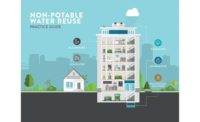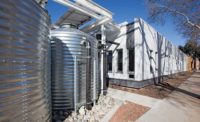
John Rehring is a vice president and senior client services manager with Carollo Engineers in Broomfield, Colo. For 30 years, he has focused on water supply and reuse planning and implementation across the Southwest. In recent years, he has managed two direct potable reuse demonstration projects and the Denver One Water Plan.
The reliability of water supplies in the arid and semi-arid Mountain States is a growing concern for the public and the engineering community in the wake of persistent drought and a multiyear downward trend in Colorado River flow and storage. Robust snowpack in early 2023 brought a welcome reprieve, but one good year cannot overcome decades of drought.
Today, potable water reuse—purifying recycled water to drinking water standards—is a viable strategy for maximizing the efficient use of available water supplies. In November 2022, the Colorado Dept. of Public Health and Environment (CDPHE) completed a multiyear regulatory development process with formal approval of a new direct potable reuse (DPR) rule in the state’s drinking water regulation. DPR recaptures reclaimed water and purifies it at an advanced water purification facility without first discharging it to an “environmental buffer,” such as a stream or aquifer. Colorado’s DPR rule is the nation’s first comprehensive regulation to authorize DPR. While there are federal-level regulations for drinking water, states are responsible for regulating all types of water reuse. Colorado utilities can now evaluate DPR implementation costs and requirements with certainty, facilitating informed planning and decisions about future water supply portfolios.
DPR is one of many tools in the water supply toolbox. Water resource decisions are necessarily influenced by supply and demand dynamics, community values and priorities as well as technical, managerial and financial capacities. Moreover, the ability to recycle water can be limited by water rights considerations linked to the water’s source.
CDPHE deserves high praise for developing the DPR rule and the inclusive process they led to hone its details. The DPR rule provides for public health protection with implementation flexibility and adaptability appropriate for inland water utilities. Process trains using reverse osmosis (RO) are allowed under the rule, but alternate technologies are also permitted.
The concentrated brine produced by RO can be challenging to dispose of without access to an ocean outfall, and disposing of this waste can result in permanent loss of 15% to 20% of the water we seek to preserve through reuse.
One alternative to RO under the Colorado DPR rule is carbon-based advanced treatment (CBAT) to transform treated municipal wastewater into potable water meeting drinking water standards.
The PureWater Colorado mobile DPR demonstration trailer provides the world’s first pilot-scale demonstration of CBAT technology for DPR. Built inside of a transportable trailer, the system was conceived and primarily funded by Colorado Springs Utilities, designed by Carollo Engineers and built by staff and students at the Colorado School of Mines. Its construction and initial operations were supported by a grant from the Colorado Water Conservation Board. It has operated in Colorado Springs and Aurora, Colo., in support of those utilities’ exploration of potential future DPR. The demonstration project also has been designed to test alternate technologies, such as removal of per- and polyfluoroalkyl substances (PFAS) and split-stream CBAT/RO treatment for salinity control. As the mobile demonstration travels to additional communities, it will continue to be a critical tool in advancing water purification technologies for DPR and community awareness of this sustainable water supply option.





Post a comment to this article
Report Abusive Comment